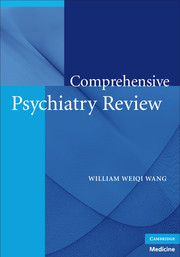Book contents
- Frontmatter
- Contents
- Introduction
- PART I INTELLECTUAL FOUNDATION OF PSYCHIATRY
- PART II EVALUATION AND MEASUREMENT
- 6 Evaluation of Signs and Symptoms
- 7 Classification and Diagnosis
- 8 Psychometrics
- 9 Biostatistics
- PART III PSYCHIATRIC DISORDERS
- PART IV PSYCHIATRIC THERAPEUTICS
- PART V NEUROPSYCHIATRY AND RELEVANT NEUROLOGIC CONDITIONS
- PART VI SPECIAL TOPICS
- PART VII REVIEW QUESTIONS
- Bibliography
- Index
8 - Psychometrics
from PART II - EVALUATION AND MEASUREMENT
Published online by Cambridge University Press: 18 January 2010
- Frontmatter
- Contents
- Introduction
- PART I INTELLECTUAL FOUNDATION OF PSYCHIATRY
- PART II EVALUATION AND MEASUREMENT
- 6 Evaluation of Signs and Symptoms
- 7 Classification and Diagnosis
- 8 Psychometrics
- 9 Biostatistics
- PART III PSYCHIATRIC DISORDERS
- PART IV PSYCHIATRIC THERAPEUTICS
- PART V NEUROPSYCHIATRY AND RELEVANT NEUROLOGIC CONDITIONS
- PART VI SPECIAL TOPICS
- PART VII REVIEW QUESTIONS
- Bibliography
- Index
Summary
Mental faculties were once seemed not measurable in the era of classic physics. However, around the transition of the nineteenth and twentieth centuries, when Charles Darwin's theory of natural selection became popularized, there was a growing desire for an objective tool to measure the ability of species and individuals. It was Francis Galton (1822–1911), Darwin's cousin, an English scholar with encyclopedic knowledge in many fields, who started his effort in measuring intelligence. Galton was often referred to as the father of the science of psychometrics. Another discipline of psychology, psychophysics, born around the same time, also contributed to the study of psychometrics. Psychophysics studies the correlation between physical stimuli and biological responses. Some psychophysical studies described in this book are the changes of evoked potentials in patients with schizophrenia and other mental disorders.
In the past century, a vast number of psychometric tests were invented, and a portion of it remains in active use. With the assistance of biostatistics and information technology, many psychometric instruments have been tested for validity and reliability, and standardized against normal population. The available psychometric instruments can measure a wide range of neurological, mental, and behavioral symptoms and functions including general intelligence, specific abilities, attitudes, academic potentials, personality traits, developmental delays, coping and adaptive skills, social functioning, severity and change of symptoms, and adverse effects of treatments.
The following is a list of selected psychometric tools frequently mentioned and used in clinical settings
▶ Projective test
▶ Draw-a-Person Test
▶ Rorschach Test
▶ Thematic apperception test (TAT)
▶ Wisconsin Card Sorting Test
▶ Word-association
▶ Neuropsychological functioning tests
▶ Bender Gestalt Test
▶ Halstead-Reitan Neuropsychological Battery
▶ Wada test
▶ Wechsler Intelligence Scales
[…]
- Type
- Chapter
- Information
- Comprehensive Psychiatry Review , pp. 57 - 64Publisher: Cambridge University PressPrint publication year: 2009



